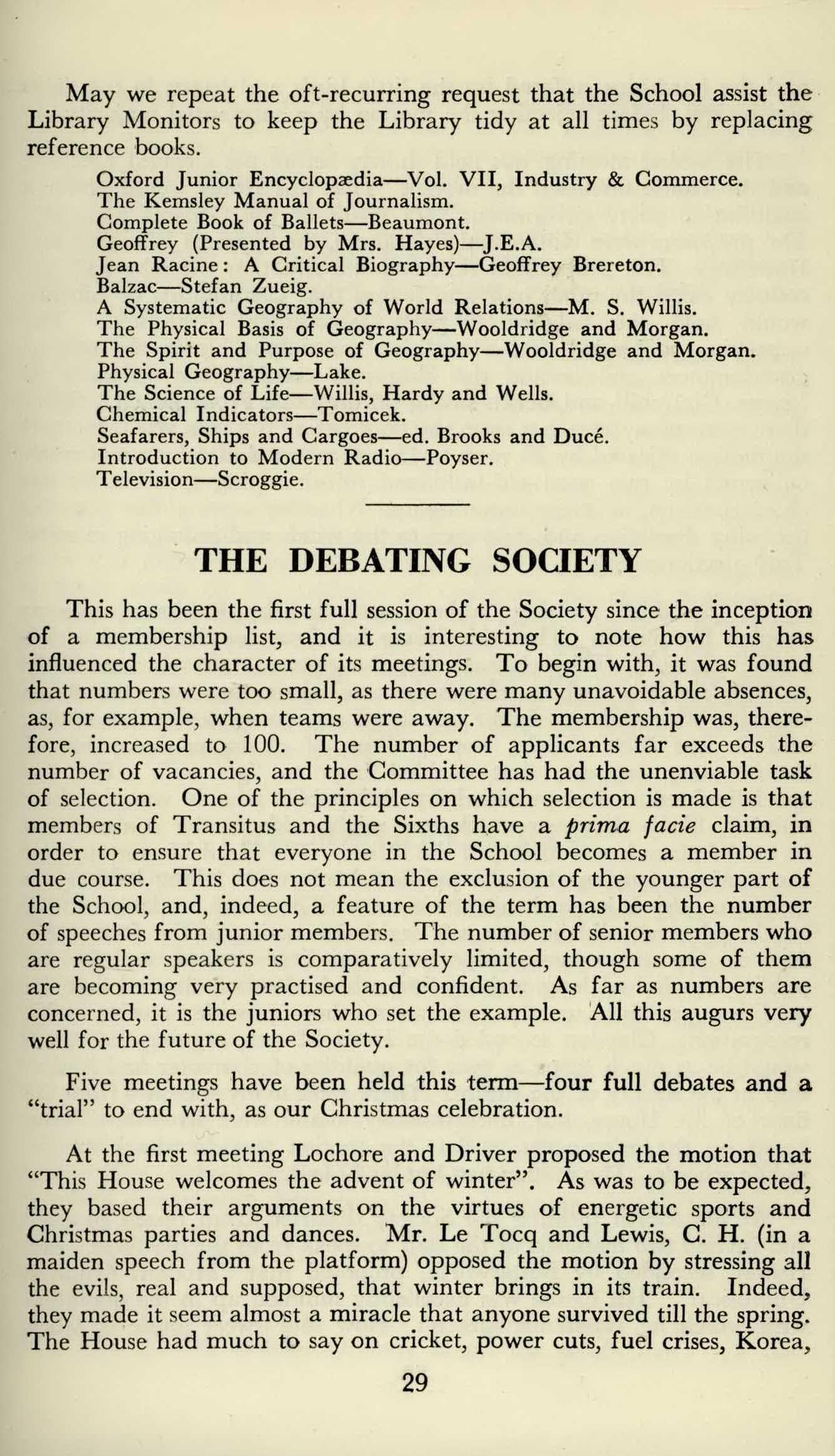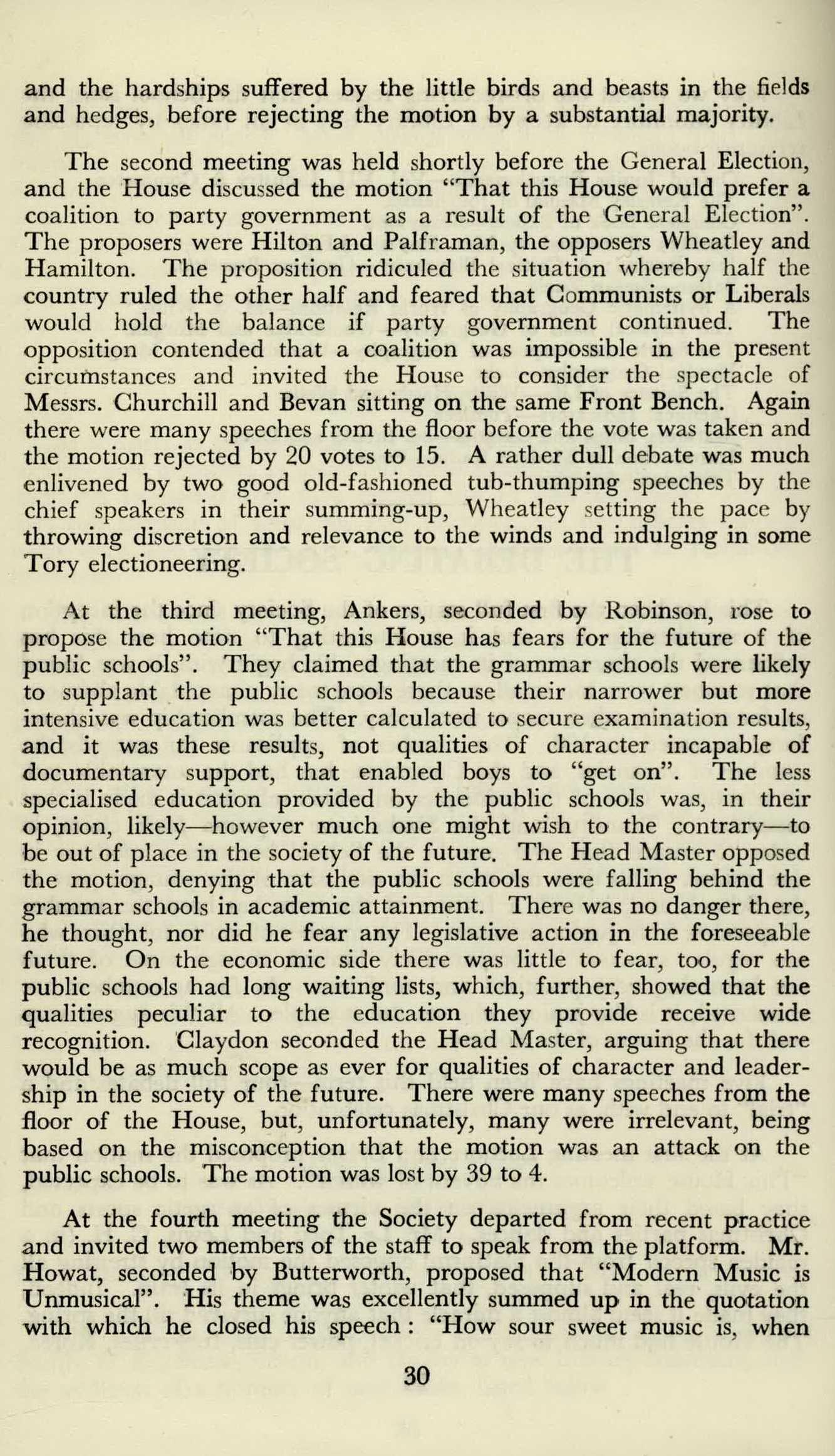
4 minute read
The Debating Society
from Jan 1952
by StPetersYork
May we repeat the oft-recurring request that the School assist the Library Monitors to keep the Library tidy at all times by replacing reference books.
Oxford Junior Encyclopaedia—Vol. VII, Industry & Commerce. The Kemsley Manual of Journalism. Complete Book of Ballets—Beaumont. Geoffrey (Presented by Mrs. Hayes)—J.E.A. Jean Racine : A Critical Biography—Geoffrey Brereton. Balzac—Stefan Zueig. A Systematic Geography of World Relations—M. S. Willis. The Physical Basis of Geography—Wooldridge and Morgan. The Spirit and Purpose of Geography—Wooldridge and Morgan. Physical Geography—Lake. The Science of Life—Willis, Hardy and Wells. Chemical Indicators—Tomicek. Seafarers, Ships and Cargoes—ed. Brooks and Duce. Introduction to Modern Radio—Poyser. Television—Scroggie.
This has been the first full session of the Society since the inception of a membership list, and it is interesting to note how this has influenced the character of its meetings. To begin with, it was found that numbers were too small, as there were many unavoidable absences, as, for example, when teams were away. The membership was, therefore, increased to 100. The number of applicants far exceeds the number of vacancies, and the Committee has had the unenviable task of selection. One of the principles on which selection is made is that members of Transitus and the Sixths have a prima facie claim, in order to ensure that everyone in the School becomes a member in due course. This does not mean the exclusion of the younger part of the School, and, indeed, a feature of the term has been the number of speeches from junior members. The number of senior members who are regular speakers is comparatively limited, though some of them are becoming very practised and confident. As far as numbers are concerned, it is the juniors who set the example. All this augurs very well for the future of the Society.
Five meetings have been held this term—four full debates and a "trial" to end with, as our Christmas celebration.
At the first meeting Lochore and Driver proposed the motion that "This House welcomes the advent of winter". As was to be expected, they based their arguments on the virtues of energetic sports and Christmas parties and dances. Mr. Le Tocq and Lewis, C. H. (in a maiden speech from the platform) opposed the motion by stressing all the evils, real and supposed, that winter brings in its train. Indeed, they made it seem almost a miracle that anyone survived till the spring. The House had much to say on cricket, power cuts, fuel crises, Korea, 29
and the hardships suffered by the little birds and beasts in the fields and hedges, before rejecting the motion by a substantial majority.
The second meeting was held shortly before the General Election, and the House discussed the motion "That this House would prefer a coalition to party government as a result of the General Election". The proposers were Hilton and Palframan, the opposers Wheatley and Hamilton. The proposition ridiculed the situation whereby half the country ruled the other half and feared that Communists or Liberals would hold the balance if party government continued. The opposition contended that a coalition was impossible in the present circumstances and invited the House to consider the spectacle of Messrs. Churchill and Bevan sitting on the same Front Bench. Again there were many speeches from the floor before the vote was taken and the motion rejected by 20 votes to 15. A rather dull debate was much enlivened by two good old-fashioned tub-thumping speeches by the chief speakers in their summing-up, Wheatley setting the pace by throwing discretion and relevance to the winds and indulging in some Tory electioneering.
At the third meeting, Ankers, seconded by Robinson, rose to propose the motion "That this House has fears for the future of the public schools". They claimed that the grammar schools were likely to supplant the public schools because their narrower but more intensive education was better calculated to secure examination results, and it was these results, not qualities of character incapable of documentary support, that enabled boys to "get on". The less specialised education provided by the public schools was, in their opinion, likely—however much one might wish to the contrary—to be out of place in the society of the future. The Head Master opposed the motion, denying that the public schools were falling behind the grammar schools in academic attainment. There was no danger there, he thought, nor did he fear any legislative action in the foreseeable future. On the economic side there was little to fear, too, for the public schools had long waiting lists, which, further, showed that the qualities peculiar to the education they provide receive wide recognition. Claydon seconded the Head Master, arguing that there would be as much scope as ever for qualities of character and leadership in the society of the future. There were many speeches from the floor of the House, but, unfortunately, many were irrelevant, being based on the misconception that the motion was an attack on the public schools. The motion was lost by 39 to 4.
At the fourth meeting the Society departed from recent practice and invited two members of the staff to speak from the platform. Mr. Howat, seconded by Butterworth, proposed that "Modern Music is Unmusical". His theme was excellently summed up in the quotation with which he closed his speech : "How sour sweet music is, when











